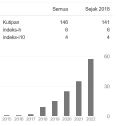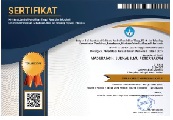STRATEGI PUSAT PENGEMBANGAN AGENSI HAYATI (PPAH) SHINTA DALAM MENGEMBANGKAN PRODUK AGENSI HAYATI DI KECAMATAN GALIS KABUPATEN PAMEKASAN
Abstract
Plant protection is an integral part of the system and business sustainability. The Agency's biological Development Center (PPAH) as the first door for farmers or farmers groups in empowering farmers in integrated pest control. The purpose of the research is to identify factors internal and external environments that include strengths, weaknesses, opportunities and threats for the PPAH Shinta in developing Biological Agency in Pamekasan Galis and define alternative strategies PPAH Shinta.
The results showed the internal, external factors and alternative strategies as follows: internal factors which contributed towards the development of PPAH Shinta in developing biological products to agencies in district of Galis, Pamekasan strength: tooling AH, enough Experience, the number of members is pretty good, service, increasing revenue PPAH Shinta. While the disadvantage is: low-member partipasi, lack of product diversification, the partnership has not been optimized and insufficient counselling as well as dependence on government programs. The external factors which influence on development of the PPAH Shinta in developing biological products to agencies in district of Galis, Pamekasan have opportunities: the potential of vast open land, many farmers, the potential amount of resources (commodities variety), development of supportive government policies, AH. While the threats are: many who develop, farmers less leverage the use of biodiversity, the Trust Agency farmers against product quality the effect is longer, better quality competitors, following standard Laboratory applications PHPOPTH. An alternative strategy is the best that can be done for the development of the power strategy is the PPAH shinta peluan (aggressive), where implementation may be done in developing the Agency's biological products in Pamekasan Galis is maximizing the use of facilities and human resources to improve and expand the number and type of products to increase production of Biological Agens PPAH Shinta.
Keywords
Full Text:
PDFReferences
Alia M. N., 2009, Bakteri Streptomyces Griseus, dikutip dari http://unalea.blogspot.com/2009/03/bakteri-streptomyces-griseus.html. Diakses pada tanggal 15 februari 2013.
Agrios G.N. 1996. Ilmu Penyakit Tumbuhan, Gadjah Mada University Press. Yogyakarta.
Anonimous, 2001. Tentang Pedoman Pengembangan Agensia Hayati di Jawa Timur, Dinas Pertanian Propinsi Jawa Timur.
, 2002. Model Budidaya Tanaman Sehat (Budidaya Tanaman Sayuran Secara Sehat Melalui Penerapan PHT). Direktorat Jendral Tanaman pangan dan Hortikultura. Jakarta.
, 2012a. Pamekasan Dalam Angka. Dinas Pertanian Kabupaten Pamekasan.
, 2012b. Agens Pengendali Hayati, dikutip dari http://blog.ub.ac.id/noviadwirani/2012/06/16/agens-pengendali-hayati/ Diakses pada tanggal 15 Februari 2013.
, 2013a. Kondisi Geografis Kabupaten Pamekasan. Pamekasan dalam angka. Diakses pada 27 Mei 2013 jam 15.30
, 2013b. Kecamatan Galis Kabupaten Pamekasan. Pamekasan dalam angka. Wikipedia Indonesia. Kecamatan galis.blogspot.com/Diakses pada 27 Mei 2013 jam 13.03
Balai Proteksi Tanaman Pangan dan Hortikultura (BPTPH), 2002. Kaji Terap Uji Antagonisme Cendawan Gliocladium sp. Secara In Vitro terhadap Penyakit Tanaman Jeruk. Banjar Baru.
Benu Olfie L. Suzana; Joachim N.K. Dumais; Sudarti. 2010. Analisis Efisiensi Pengunaan Fkator Produksi Pada Usahatani Padi Sawah Di Desa Mapuya Utara Kecamatan Dumoga Utara Kabupaten Bolaang Mungondow. Jurnal ASE volume 7 nomor 1.
David, 2002. Analis Swot Suatu Pengantar, Edisi Kedua, Cetakan Ketiga Penerbit Andi Yogyakarta.
DOI: http://dx.doi.org/10.53712/maduranch.v10i10.234
Refbacks
- There are currently no refbacks.
Indexed by:
Published by Fakultas Pertanian Universitas Madura
Jl. Raya Panglegur Km 3,5 Pamekasan
Phone: (0324) 322231
website: http://http://ejournal.unira.ac.id/index.php/jurnal_peternakan_maduranch/index
Email: maduranch@unira.ac.id

MADURANCH by Universitas Madura is licensed under a Creative Commons Attribution 4.0 International License.











